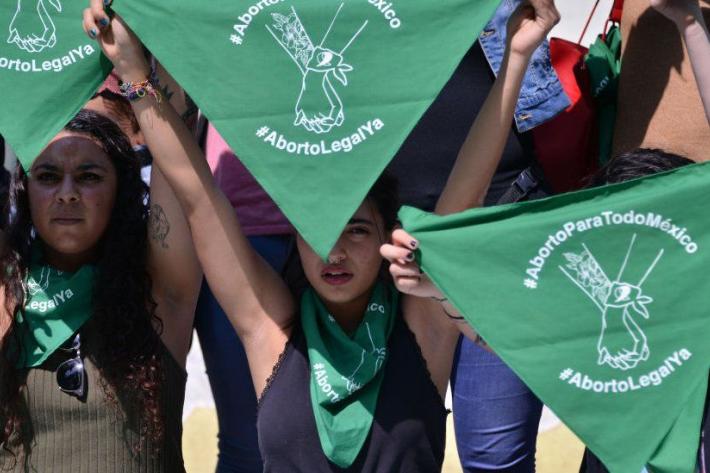Latest press releases
A selection of stories from across the Federation

Netherlands
Rutgers triumphs in landmark court case against lies, online hate and disinformation
Rutgers, the Netherlands’ leading sexual and reproductive health expert and IPPF’s Member Association, has today secured a landmark legal win against an ultra-conservative group.
For media enquiries


| 17 November 2022
UK Autumn budget doesn't go far enough
If you are covering the UK autumn budget and reporting on foreign aid, you may find the below statement from the International Planned Parenthood Federation (IPPF) helpful: “The UK government has already decimated the aid budget and its reputation through severe economic mishandling, cutting billions from the very things that protect people during economic, political and social upheaval, including life-saving sexual and reproductive healthcare. “It is also the only country to be spending the majority of its dedicated overseas aid budget within its own borders, taking advantage of legislation to pay for refugee and asylum costs in the UK rather than increasing domestic and overseas budgets accordingly. “The UK government cannot continue to fight the fire of one humanitarian crisis by diverting much-needed resources from other vulnerable people, nor continue to balance its books on the backs of the poorest people in the world - who, as MP Andrew Mitchell stated, will be damaged, maimed, or die as a result. “This government promised to give women and girls the freedom they need to succeed and prevent the worst forms of human suffering worldwide. If it is to deliver on its promises and revive its sunken reputation, it must spend dedicated budgets correctly, support people in the UK and beyond appropriately, and MP Andrew Mitchell and the Chancellor must ensure a return to the 0.7% as soon as possible.”

| 22 February 2022
Colombia decriminalizes abortion
Today, the Colombian Constitutional Court decriminalized abortion up to 24 weeks in another victory for the Green Wave sweeping through Latin America. The historic decision follows years of campaigning by women's right's activists across Colombia and came off the back of two lawsuits that asked the court to declare article 122 of the penal code, that "the woman who causes her abortion or allows another to cause it, will incur a prison sentence from sixteen (16) to fifty-four (54) months" as unconstitutional. The court called an extraordinary meeting today, Monday 21st February, and took just a few hours to come to its decision which will go into effect immediately. ProFamilia, the International Planned Federation's Member Association in Colombia, and Colombia's largest provider of legal abortion care were heavily involved in pushing to extend the rights of those needing to access abortion care. Marta Royo, Executive Director for Profamilia, IPPF's Member Association in Colombia, said: "Today is a ground-breaking moment for the people of Colombia and a long-overdue guarantee of reproductive rights and dignity for all those who need abortion care, especially poor and rural women who bear the brunt of restrictive abortion policies. "The decriminalization of abortion up to 24 weeks in Colombia and the Green Wave movement across Latin America is centred not just on public health, but also the full lives, citizenship and human rights of girls, adolescents, and women – who, for multiple reasons, including inequity, access to education, gender-based violence and barriers to healthcare – continue to face unintended pregnancies. "The freedom for women to finally make their own choices about their pregnancies and their bodies is fundamental to disrupting the cycle of poverty that so many in Colombia face. This monumental decision is also a win for the dedicated health care providers, who will finally be recognized as people who simply care about the needs of others." While Colombian women have supposedly been able to access abortion care since 2006 under three circumstances: if their life or health is at risk, in cases of fatal foetal abnormalities, or if the pregnancy is the by-product of rape or incest, in reality, the criminalization of abortion persisted. The Guttmacher Institute found that less than one per cent of the estimated 400,000 abortions carried out each year in Colombia are performed legally, with women, especially poor, rural, vulnerable and marginalized women, facing significant barriers to accessing safe and timely abortion care. Many Colombian women are instead forced to carry their pregnancies to term or else seek other methods to end them. Figures collected by ProFamilia showed that during 2020, there were at least 26,223 unsafe abortions across Colombia, a startling amount for which consequences range from infection to life-changing injuries to death. As per the previous abortion law, other women have been imprisoned for up to four and a half years for having an abortion, even in cases where abortion should have been legal. In a shocking example of discrimination, data collected showed that poor rural women were more likely to be charged, with a third of those who faced charges also survivors of sexual violence. Eugenia Lopez Uribe, IPPF's Regional Director for Americas and the Caribbean Region, said: "Today Colombia took another step in the right direction for gender equality and full human rights for all, and we are incredibly proud of IPPF's Member Association, ProFamilia, for their tireless work alongside thousands of activists across Colombia and Latin America "This 24-week decriminalization is historic in the region and especially remarkable when we consider the current fragility of abortion rights globally and the anti-choice movements which continue to plague nations across the world, including in countries close to home like the United States of America. "While today we are celebrating this historic decision, the Green Wave is strong and growing, and the fight for reproductive rights and justice will not end until every person can access high-quality sexual and reproductive healthcare when and where they need it." For media enquiries in English, please contact Karmen Ivey on [email protected] or [email protected] For media enquiries in Spanish or during UK night-time hours, please contact Pamela Martin Garcia on [email protected]

| 21 February 2022
Mexico’s Supreme Court votes to decriminalize abortion
The International Planned Parenthood Federation (IPPF) welcomes the unanimous decision taken by the Supreme Court of Mexico to decriminalize abortion. The decision is a step closer for women and pregnant people to fully exercise their reproductive rights and bodily autonomy through safe and legal abortion care. Abortion is legal in four out of the 32 federal entities in Mexico. Only four other countries in the region - Argentina, Cuba, Uruguay, and Guyana have almost unrestricted and legal access to abortion care. Eugenia Lopez Uribe, IPPF’s Regional Director for the Americas and Caribbean said: “This historic ruling by the Supreme Court of Mexico is thanks to the feminist movement in Mexico and in the region, who have been relentless in their fight the law to recognize the dignity and humanity of people seeking abortion care. This decision will continue the Green Wave ripple effect across the region - we look at Argentina last year and now Mexico, these movements give us hope and motivation to continue to fight for sexual and reproductive health and rights for all.” Esperanza Delgado, Strategic Director for Advocacy and Interinstitutional Relations of MEXFAM added: “September 7 will become a memorable date in Mexico. In a progressive pronouncement in favour of reproductive autonomy, respect for the secular State, and the rights of women and pregnant people over those of the embryo, Mexico's highest legal authority indicated that it is unconstitutional to punish those who decide to terminate a pregnancy at its early stage. “All of us who have joined forces and who are fortunate enough to fight for the recognition of human rights, should be proud and may our achievement inspire others in every corner of the planet. MEXFAM is committed to making this long-awaited legislation a reality for every person that decides to choose.” For media inquiries please contact [email protected]

| 21 February 2022
Statement on the Guttmacher Institute's “Just the Numbers” report: a snapshot of the impact of the UK aid cuts
The Guttmacher Institute has today released new data showing the impact of the UK aid cuts on sexual and reproductive health and rights for the fiscal year 2021 - 2022. The figures show the devastating impact on the lives of women and girls around the world. Together with the effects of the Covid-19 pandemic, the cuts threaten to undo years of progress towards gender equality and increasing access to reproductive choice. When surveyed, major sexual and reproductive health organizations reported they expected to receive at least £218.9 million in the fiscal year (FY) 2021–2022 (from April 2021 to March 2022) for family planning activities in low- and middle-income countries. The resulting cuts to the family planning programs of these major program-implementing organizations are estimated to have totalled £132.4 million in FY 2021–2022. The loss of funding will result in: 9.5 million fewer women and couples receiving contraceptive services 4.3 million more unintended pregnancies 1.8 million more unplanned births 1.4 million more unsafe abortions and 8000 more maternal deaths The figures also show how much could have been achieved through sustained UK aid spending. IPPF’s Director-General, Dr Alvaro Bermejo, said: “The Guttmacher figures are a harrowing, but sadly unsurprising, insight into the catastrophic impact that the UK aid cuts will have on the health and lives of millions of women, girls and marginalized people across the globe, and serve to confirm what sexual and reproductive health charities have been saying since they were first made aware of the cuts. “We must also remember that the Guttmacher numbers are just a snapshot of the 2021 – 2022 fiscal year, and the effects of the Government’s sudden and short-sighted termination of support will stretch far beyond that, piling unthinkable pressure on people already dealing with the fallout of the COVID-19 pandemic, and leading to millions of unintended pregnancies and thousands of preventable deaths. “With the upcoming spending review in November, we ask the UK Government to reconsider the cuts, which IPPF still believe to be outside of the boundaries of the law, and reinstate the 0.7% commitment, so that it can finally deliver on its promises to the millions of people it chose to abandon.” IPPF also signed on to a joint letter from the UK SRHR Network. For media inquiries please contact [email protected]

| 21 February 2022
Statement on the first anniversary of the rescindment of the Global Gag Rule
28 January 2022 heralds one year since President Biden rescinded the harmful Global Gag Rule (GGR). Otherwise known as the Mexico City Policy, its expansion in 2017 under Trump affected 12 billion dollars of funding, impacting thousands of life-saving healthcare services worldwide – especially across low-income countries. But while rescindment is a positive first step, the long-term harm of the Global Gag Rule lingers on. For IPPF, 53 healthcare projects in 32 countries were hit, with some Member Associations losing up to 60% of their funding. Programmes affected include HIV prevention and care, maternal health and nutrition, STI services, gender-based violence prevention, and services for vulnerable children. And although we have begun to re-establish long-standing partnerships, it takes time for funding to flow and to re-open closed healthcare clinics and community services – with some lost forever. In the meantime, there are women and girls who desperately need healthcare that have nowhere to turn. But in February, the US Congress has an opportunity to change the sexual and reproductive health landscape forever through a final negotiated funding bill that includes a permanent end to the deadly Global Gag Rule. As we celebrate one year of rescindment, we know the work is not done yet, but we are hopeful for the futures of millions of women and girls worldwide. We urge the US Congress to permanently repeal the Global Gag Rule to fully eradicate the lasting impact of the Mexico City Policy that has harmed women and girls around the world for 40 years. Dr Alvaro Bermejo, Director-General of the International Planned Parenthood Federation, said: "Five years ago, Trump expanded the Global Gag Rule, a devastating neo-colonialist policy that forbids US aid to any organization that supports access to safe abortion care, disproportionately affecting women and girls in low-income countries. Today we mark one year since President Biden rescinded it, but the long-term harm and impacts don't simply go away. "The Gag Rule is a callously designed mechanism set up to deny women and girls the right to decide what happens to their bodies. Its implementation doesn't just destroy life-saving abortion services but erodes access to other sexual and reproductive healthcare, including contraception, leading ultimately to increases in unintended pregnancy and forcing many to turn to unsafe and dangerous abortion methods. "While rescindment is a positive first step, the looming threat of reinstatement under future anti-rights administrations undermines the sustainability of global sexual health programs and the pace of progress. After 40 long years, the time to act is now – we urge the US Congress to end this political game and stand up for the futures of millions of at-risk women and girls by permanently repealing the Global Gag Rule. "By leaving a legacy that gives hope and stability to the sexual and reproductive health of people worldwide, the US will once again be a champion, leader, and innovator of human rights for all." For media inquiries please contact [email protected]
















